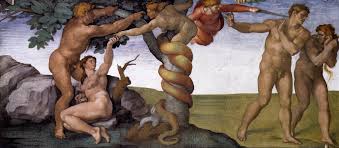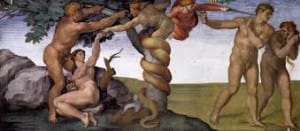There was a time, not too long ago, when mentioning Area 51 or aliens, invited ridicule as a conspiracy theorist. But the difference between a conspiracy theory and reality is currently measuring about four years so that many Americans (2/3 according to a 2021 Pew Research study) now believe that extra-terrestrial intelligence (ETI) exists. Interestingly enough, American Catholics believe at a slightly higher rate than Americans as a whole. One can only speculate why that might be, but the Church has not spoken definitively on the subject leaving Catholics somewhat free to follow the evidence. It is the qualifier “somewhat” that I would like to use as the launching pad for a discussion of ETI given that Divine Revelation gives us some guardrails for investigation as to both the possibility and the likelihood.
It is worth mentioning at least at the outset that we already have proof that we are not alone in the universe. Angels and their fallen counterparts are constantly acting within material creation, even in visible ways. It is certainly possible that the UFO sightings and even the discovery of “non-human biologics” are simply diabolical manifestations. But it is contemptuous to insist upon this as the only possible explanation.
Setting Up the Guardrails
The temptation when dealing with the question is to leave it to “science” to determine the possibility and likelihood of intelligent life. This approach neglects the fact that theology is also a science. Because its first principles come from God Who can neither deceive nor be deceived, it is the highest of the sciences.
By looking to theology, we are able to eliminate some possibilities. The ETI must be of a completely different race from mankind in that they have a different line of descent. The Church has condemned polygenism and so there must be more than mere accidental differences between human and the other race of ETIs. They must be a different substance altogether. In other words, they would have to be biologically distinct humanoids with a rational soul. Scripture and the Magisterium both describe the “human race” as descended from Adam so that it at least seems possible (an argument from silence) that there could be another race or races in the universe.
Once we allow at least for the possibility, then we must examine the ETIs relationship to Christ. For everything that exists, exists in relationship to Christ Who “is the center of the universe and of history” (Pope St. John Paul II,Redemptoris Hominis, 1 ). St Paul tells the Colossians that “in Him were created all things in heaven and on earth, the visible and the invisible, whether thrones or dominions or principalities or powers; all things were created through Him and for Him” (Col 1:16-20). This point is vital not only in considering ETI, but in understanding reality as a whole. Everything that exists, does so for His sake (not only for His sake but primarily). Fig trees were created for Him to curse, trees for crosses and water for baptism. Most importantly, human nature exists for His sake so that He might take on human flesh.
The fact that Christ took on human flesh gives to the human race a special dignity such that “all material creatures[exist] for the good of the human race” (CCC 353). This would include ETI who, even if rational beings existing for their own sake, would exist in a similar manner to the angels, acting in service to the race of Adam. This might be an argument against the existence of ETI in that we appear not to have received any benefit from them. This is likely an argument St Thomas would have made in light of his contention that to speak of a universe in any meaningful way is to assume that the elements must form an ordered an interactive whole. If there were no communication among the citizens, then the civil good could not be perfected (c.f ST I q.47, a.3). Communication could still come later, but it is hard to imagine why it would be so delayed.
Building on the principle that the ETI must be related to Christ, then we can examine the relation of the race itself. First, we would posit that they were, like the angels and mankind, created in a probationary state of grace. As St. Thomas says, “It pertains to divine freedom to infuse grace into all who are capable of grace, unless something resisting is found in them, much more than he gives natural form to any disposed matter” (Commentary Sentences, 4, q.1 art.3). The question would then be what the outcome of their testing was.
Fallen or Unfallen?
One thing that becomes immediately clear in reading the New Testament is that in the act of redemption, God willed a correspondence between the fallen and the Redeemer “since the children share the same blood and flesh, he too shared equally in it, so that by his death he could…set free those who had been held in slavery all their lives by fear of death” (Heb. 2:14). This means that if the ETI were fallen, they would need a separate incarnation. A second incarnation however would be incompatible with the Faith according to an infallible teaching found in Dominus Iesus: “Therefore, the theory which would attribute, after the incarnation as well, a salvific activity to the Logos as such in his divinity, exercised ‘in addition to’ or ‘beyond’ the humanity of Christ, is not compatible with the Catholic faith” (DI, 10). The Son’s sole redemptive act is through His human nature. Therefore, there can be no other fallen race in existence.
This leaves open only one possibility; that there is a heretofore unknown, unfallen race of intelligent creatures in the universe. Like the Angels, Christ would be their Lord and Head, but not their Redeemer. In His human nature Christ is “the name that is above every name, that at the name of Jesus every knee should bend, of those in heaven and on earth and under the earth, and every tongue confess that Jesus Christ is Lord, to the glory of God the Father” (Phil 2:12-13).

St Thomas says that if Adam had not fallen then he would immediately attain “that happy state of seeing God in His Essence, he would have become spiritual in soul and body; and his animal life would have ceased, wherein alone there is generation” (ST I q.100, a.2). Likewise, because they would have passed their probationary period, the ETI would have spiritual bodies (which might help to explain the manner in which UFOs seem to move) and would not reproduce. Of course one could also ask why, if they have passed their probationary period, they don’t immediately receive their reward in the beatific vision.
According to Paul Thigpen in his book Extraterrestrial Intelligence and the Catholic Faith, St Padre Pio once told a reporter that “The Lord certainly did not limit his glory to this small Earth. On other planets other beings exist who did not sin and fall as we did.” Despite this saintly endorsement, I think another saint provides the logic for why they do not exist. When speaking of how Providence guides even our sins, St Thomas says that because the angels contain a higher perfection than men, a far fewer number of them fell as compared to mankind (Sentences I D.39 q.2 A.2). It would seem that if there were a race of men that did not fall, this test of proportionality would fail and the ladder of perfection of the universe upended. It is for this reason that I ultimately find the existence of ETI very unlikely.
Before closing, I want to mention another resource that I found very helpful in addressing the existence of ETI; Marie George’s Christianity and Extraterrestrials. Part of the challenge in thinking theologically about this issue is being able to formulate the questions correctly and frame it from the perspective of Divine Providence. She does both. I might weigh her conclusions differently than she did, but her framing of the issue is invaluable for anyone who wants to approach the issue from a Catholic perspective.







